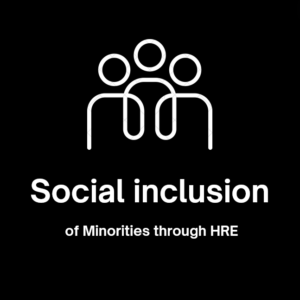
Social inclusion of Minorities through HRE
Funding Programme
Learning Mobility of Individuals, Youth mobility
Duration
02.02.2019-01.08.2019
Budget
20,565.00 €
Countries
🇷🇴Romania 🇲🇩Moldova 🇬🇪Georgia 🇦🇿Azerbaijan 🇽🇰Kosovo 🇷🇸Serbia 🇲🇰North Macedonia 🇦🇱Albania 🇨🇿Czech Republic 🇺🇦Ukraine 🇬🇷Greece 🇩🇪Germany
Project Number
2018-3-DE04-KA105-017131
Social inclusion of Minorities through HRE
In recent years, a phenomenon that Europe has been facing is the rise of intolerance, hate, extremism, even violent attacks based on ethnical base. In contrast the negative political populism is also growing. In such political polarization, young people especially those with minority and migrant backgrounds are the most vulnerable. These appearances make even more complicated the social-political inclusion of the migrants and minorities. Many reports, including the latest finding of FRA – Fundamental Rights Report 2018, are reflecting on the widespread socio-economic disadvantages of these groups of young people. Minority are victims of numerous and varied human rights violation. When issues of discrimination and identity development are coupled with factors such as fewer educational opportunities, limited access to social rights, some migrants and ethnic minority youth face a dual degree of vulnerability that places them at greater risk for negative outcomes. Lack of education leads to denial of civil and political rights, including rights to freedom of movement and freedom of expression, and limits participation in the cultural, social and economic life and in public affairs.
– increased participants knowledge about: HRE, social exclusion, intercultural dialogue and tolerance in youth work with migrants and minority people in order to prevent radicalization and human rights violations
– awared of importance of cultural diversity on local, regional and international level and to develop skills and attitudes to motivate and actively involve migrant and minorities in human rights youth projects as preventing radicalization
– developed practical competencies in Non Formal Education-specifically in HRE methods with migrant and minority people
– developed a strong network and possibly plan for future cooperation focusing on cultural diversity and active participation of migrant and minorities in order to prevent radicalization.
The event gathered 32 participants.
The training course engaged
1.youth workers who are working with migrants and minorities;
2. migrants and minorities who act as multipliers who are engaged in minorities and migrants rights, as well as general intercultural education with young members of a national, ethnic or language minority, returned asylum seekers, Roma as the biggest minority group in Europe.
As results and impact attained all participants developed local Initiatives, some of them purposely developed for ESC funds, initiatives and actions for combating human rights violations by using HRE and applying lessons learned and
